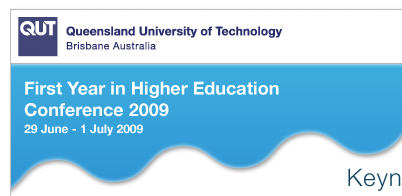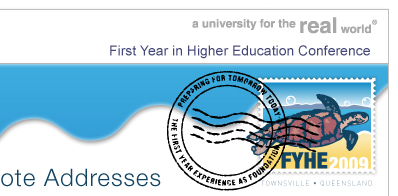| Presenter | Title |
|---|---|
Professor Keithia WilsonChair - Educational Excellence CommitteeFirst Year Advisor, School of Psychology, Griffith University |
The impact of institutional, programmatic and personal interventions on an effective and sustainable first-year student experience.
This paper presents a multi-level analysis of the dynamics, relationships and interventions that need to be understood and embraced by practitioners seeking to exercise leadership around the first-year experience.
It will be argued that 'student success' will be optimised by a combination of clear institutional policies and settings, systemic conception of first-year practice, complementary and mutually reinforcing strategies for student engagement, and attention to self-management and self-care by first-year practitioners.
|
Professor Trevor GaleDirector, National Centre for Student Equity in Higher EducationHawke Research Institute for Sustainable Societies University of South Australia |
Towards a Southern Theory of Higher Education
Crudely, social inclusion in Australian higher education is a numbers game. While the student recruitment departments of universities focus on ‘bums on seats’, equity advocates draw attention to ‘which bums’, in ‘what proportions’, and, more to the point, ‘which seats’, ‘where’. But if the counting of bums is crude, so is the differentiation of seats. Just distinguishing between courses and universities and scrutinizing the distribution of groups, is a limited view of equity.
The most prestigious seats of learning give students access primarily to dominant forms of knowledge and ways of thinking. In terms of access, it is to a diminished higher education, for all. Further, undergraduates – particularly in their first year – are rarely credited with having much to contribute. Higher education is the poorer for it. In this paper I propose an expanded conception for equity and an enlarged regard for what is being accessed by students who gain entry to university.
Drawing on Connell’s conception of ‘southern theory’, I highlight power/knowledge relations in higher education and particularly ‘southerners’: those under-represented in universities – often located south of ENTER (Equivalent National Tertiary Entrance Rank) cut-offs – and whose cultural capital is similarly marginalised and discounted.
While increasing regard for the importance of Indigenous knowledges is beginning to challenge the norms of higher education, we are yet to generalise such reconceptions of epistemology to include knowledges particular to people from regional and rural areas, with disabilities, and from low socioeconomic backgrounds. Nor have we really engaged with different ways of thinking about the physical and social world that are particular to these groups.
To take account of marginalized forms of knowledge and of thinking will mean thinking differently about what higher education is and how it gets done. The paper ends with some pointers in this direction.
|



